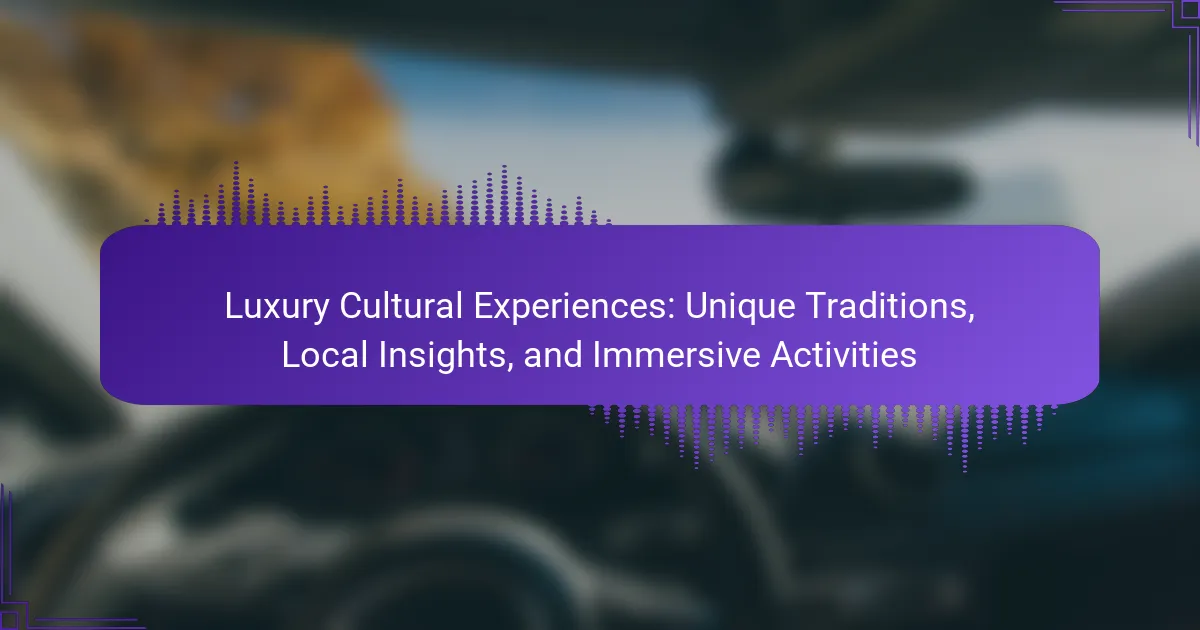Luxury cultural experiences provide travelers with deep connections to local heritage through unique traditions, exclusive access to artisans, and immersive activities. These experiences vary by region, highlighting diverse customs and insights. Engaging in personalized tours and authentic interactions enhances understanding and appreciation of different cultures. Seek out opportunities like private museum tours, traditional ceremonies, and culinary adventures for a richer travel experience.
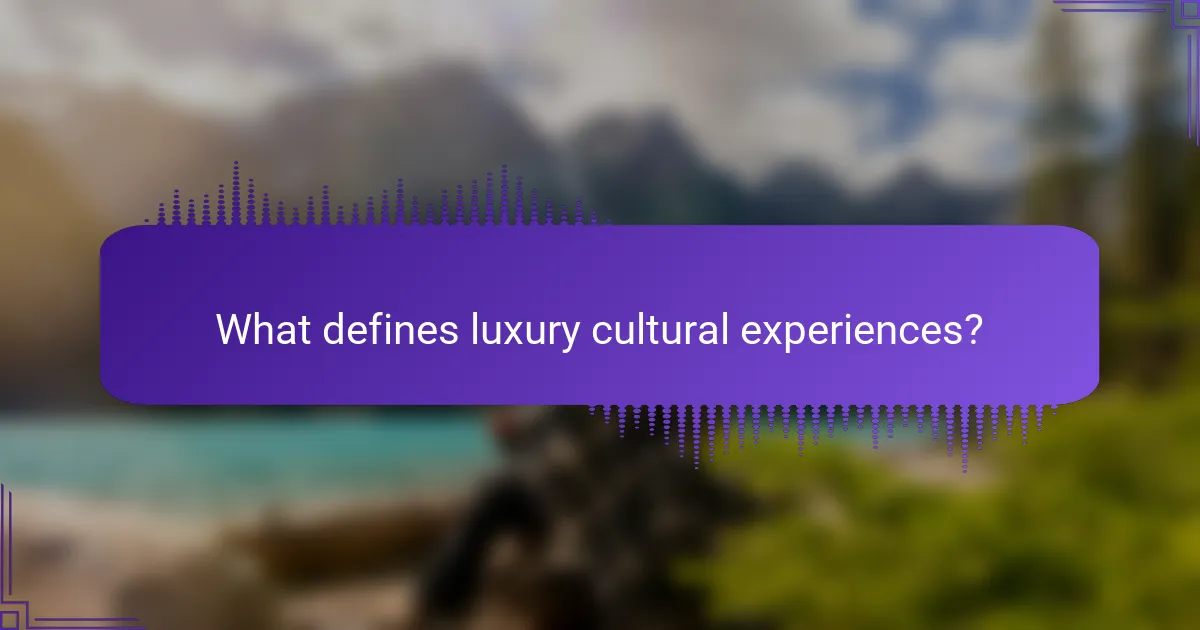
What defines luxury cultural experiences?
Luxury cultural experiences are defined by their unique traditions, local insights, and immersive activities that offer deep engagement with a culture. These experiences often include exclusive access to local artisans, private tours of historical sites, and participation in traditional ceremonies. The root attribute of luxury cultural experiences is their focus on authenticity, allowing travelers to connect meaningfully with the culture. Unique attributes may include bespoke itineraries tailored to individual interests and rare opportunities to interact with local communities in intimate settings. Overall, these experiences elevate travel by blending luxury with genuine cultural immersion.
How do immersive activities enhance cultural understanding?
Immersive activities significantly enhance cultural understanding by providing firsthand experiences of local traditions and customs. Participants engage directly with communities, fostering deeper connections and empathy. This interaction allows for authentic insights into cultural practices, promoting appreciation and respect. Unique attributes of these experiences, such as cooking classes or traditional ceremonies, create lasting memories and knowledge. As a result, immersive activities serve as powerful tools for cultural exchange and education.
Which unique traditions are celebrated globally?
Unique traditions celebrated globally include Diwali in India, Carnival in Brazil, and the Day of the Dead in Mexico. These events highlight cultural heritage through vibrant celebrations, rituals, and community gatherings. For instance, Diwali, known as the Festival of Lights, symbolizes the victory of light over darkness and good over evil. Carnival features parades, music, and dance, showcasing Brazil’s rich cultural diversity. The Day of the Dead honors deceased loved ones with altars, food, and festivities, reflecting a unique perspective on life and death. These traditions offer immersive cultural experiences, enriching local insights for travelers and participants alike.
What role do local insights play in luxury travel?
Local insights are crucial in luxury travel as they enhance cultural experiences. They provide travelers with authentic interactions and deeper connections to local traditions. Understanding unique customs and practices allows for immersive activities that are often overlooked in standard itineraries. This engagement with local culture enriches the travel experience, making it more memorable and meaningful.
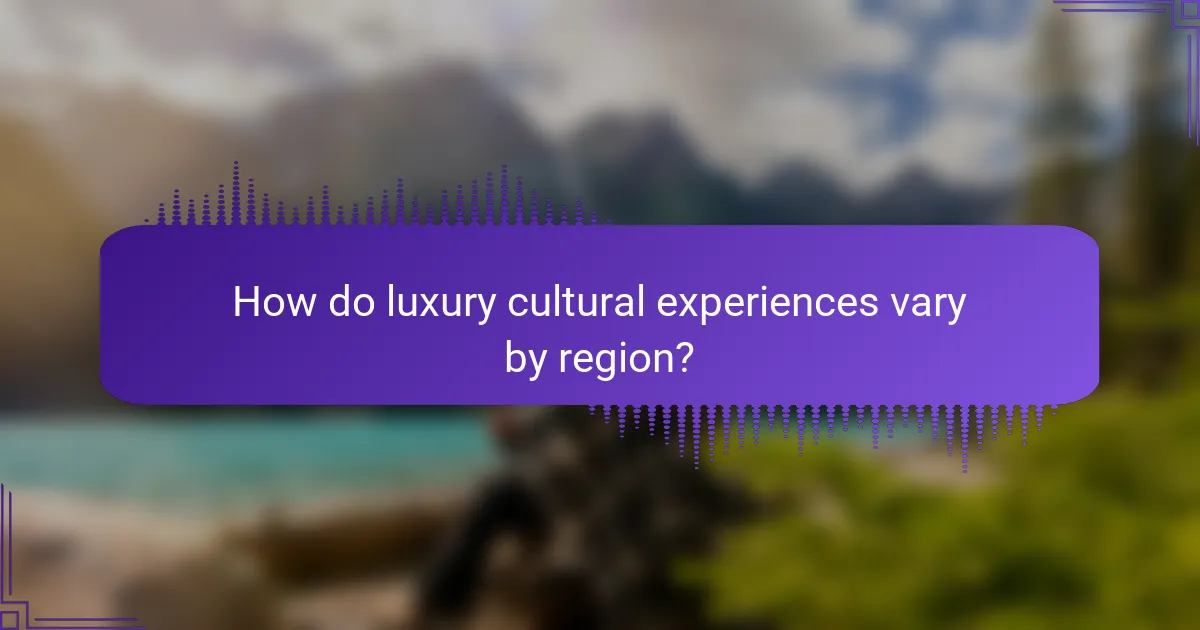
How do luxury cultural experiences vary by region?
Luxury cultural experiences vary significantly by region due to distinct traditions, local insights, and immersive activities. In Europe, art and history dominate, with experiences like private museum tours and classical music performances. In Asia, culinary adventures and traditional festivals offer unique cultural insights, such as tea ceremonies in Japan or street food tours in Thailand.
North America emphasizes diverse cultural expressions, from indigenous art to contemporary theater. South America showcases vibrant festivals and dance, particularly in Brazil and Argentina, where cultural heritage is celebrated through lively events. Africa offers rich experiences centered around wildlife and tribal traditions, such as safaris and cultural village visits.
These variations highlight how luxury cultural experiences are shaped by local customs and heritage, providing travelers with unique perspectives and unforgettable memories.
What are the most sought-after experiences in North America?
Luxury cultural experiences in North America include exclusive access to local traditions, immersive activities, and unique insights into diverse communities. Popular experiences feature culinary tours, art and music festivals, and historical reenactments. These activities often highlight regional heritage, offering travelers authentic interactions with local cultures. For instance, participating in a Native American powwow provides deep cultural insights and fosters appreciation for indigenous traditions.
Which European traditions offer exclusive cultural insights?
European traditions provide rich cultural insights through unique experiences. Notable examples include Italy’s culinary festivals, Spain’s flamenco performances, and France’s art fairs. These traditions immerse visitors in local customs and offer exclusive perspectives on heritage. For instance, Italy’s Palio di Siena showcases historical horse races, while Portugal’s Fado music embodies deep emotional storytelling. Engaging in these activities fosters a deeper connection to the region’s identity and values.
How do Asian immersive activities differ from Western ones?
Asian immersive activities often emphasize community involvement and deep cultural connections, while Western activities tend to focus on individual experiences and personal enjoyment. Asian traditions, such as tea ceremonies or festivals, highlight collective participation and shared heritage. In contrast, Western immersive experiences, like wine tastings or art tours, prioritize personal choice and self-expression. Additionally, Asian activities frequently incorporate spiritual elements, reflecting local beliefs, whereas Western experiences may lean more towards entertainment and leisure. This fundamental difference shapes how cultural immersion is perceived and enjoyed in each context.
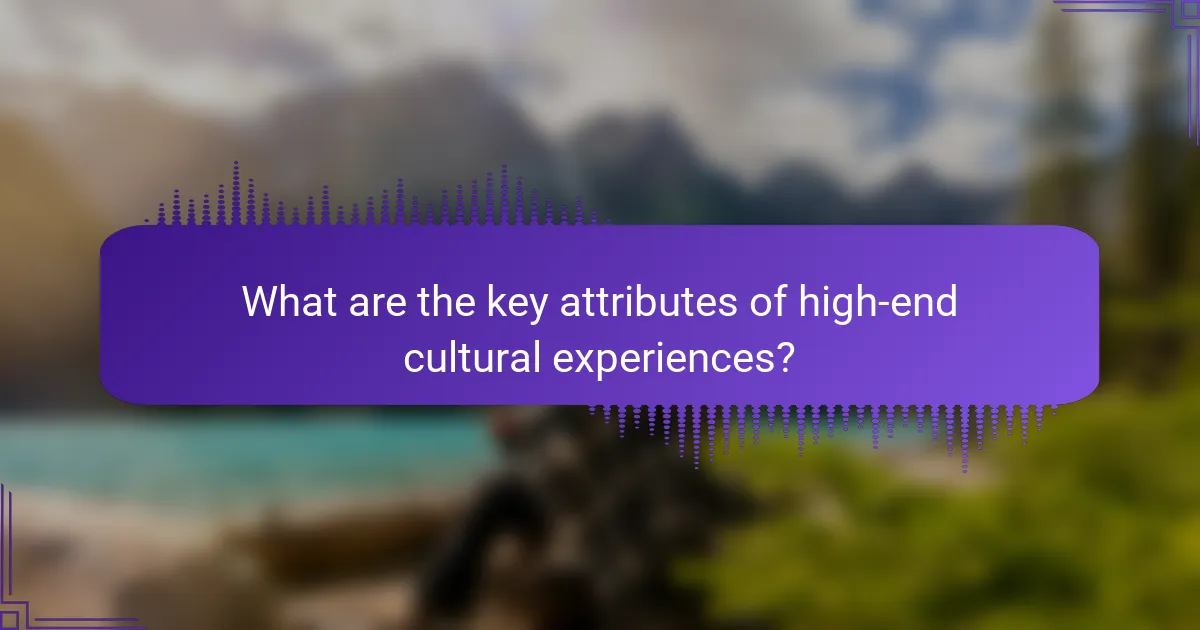
What are the key attributes of high-end cultural experiences?
High-end cultural experiences feature exclusivity, authenticity, and personalization. They often include unique traditions, local insights, and immersive activities that create lasting memories.
Key attributes include:
– **Exclusivity**: Limited access to events or locations enhances the experience.
– **Authenticity**: Genuine cultural interactions provide deeper understanding.
– **Personalization**: Tailored experiences cater to individual preferences.
– **Immersive Activities**: Engaging in local customs fosters connection.
– **Expert Guidance**: Knowledgeable hosts enrich the experience with insights.
Why are personalized itineraries important for luxury travelers?
Personalized itineraries are crucial for luxury travelers as they enhance unique cultural experiences. Tailored plans provide local insights and immersive activities that align with individual preferences. This customization ensures travelers engage deeply with unique traditions, maximizing satisfaction and creating lasting memories. Personalized itineraries also reflect a rare attribute of luxury travel, demonstrating attention to detail and exclusivity that elevate the overall journey.
How does exclusivity impact cultural engagement?
Exclusivity enhances cultural engagement by creating unique experiences that foster deeper connections with local traditions. Luxury cultural experiences offer immersive activities that highlight rare attributes of a community, making participants feel privileged and valued. These unique interactions often lead to greater appreciation of the culture, as individuals gain insights unavailable through typical tourism avenues. As a result, exclusivity not only elevates the experience but also strengthens cultural bonds and understanding.
What are the benefits of expert-led experiences?
Expert-led experiences provide tailored insights, enriching cultural understanding. They enhance authenticity through local traditions, resulting in deeper connections. Personalized guidance fosters engagement, leading to memorable interactions. Unique activities often unveil hidden gems, creating exclusive memories.

Which rare cultural experiences are worth seeking out?
Luxury cultural experiences worth seeking out include unique traditions, local insights, and immersive activities that offer deep connections to heritage. Examples include attending a traditional tea ceremony in Japan, participating in a Maasai village visit in Kenya, and enjoying a private tango lesson in Argentina. Each of these experiences provides a rare glimpse into the local culture, enriching your understanding and appreciation of diverse practices. Seek out these opportunities to engage authentically and create lasting memories.
What hidden gems can luxury travelers discover?
Luxury travelers can discover hidden gems through immersive cultural experiences that showcase unique traditions and local insights. Engaging with local artisans in a craft workshop offers a rare glimpse into regional artistry. Participating in traditional cooking classes reveals culinary secrets and flavors unique to the area. Attending local festivals provides authentic cultural immersion and connection with the community. Exploring off-the-beaten-path destinations enhances the overall travel experience, allowing for deeper connections and memorable moments.
How do seasonal events enhance cultural immersion?
Seasonal events significantly enhance cultural immersion by offering unique experiences that reflect local traditions. These events provide opportunities to engage with communities, learn about their heritage, and participate in authentic activities. For instance, festivals often showcase traditional music, dance, and cuisine, allowing visitors to connect deeply with the culture. Additionally, seasonal events can highlight specific local crafts and rituals, creating memorable interactions that foster understanding and appreciation. Engaging in these immersive activities enriches the travel experience, making it more meaningful and memorable.
What unique culinary experiences define luxury travel?
Luxury travel is defined by unique culinary experiences that immerse travelers in local traditions. These experiences include cooking classes with local chefs, exclusive wine tastings, and farm-to-table dining. Engaging with local communities enhances understanding of cultural heritage and culinary practices. Unique dishes often reflect regional ingredients and cooking techniques, offering a distinctive taste of the locale. Culinary experiences in luxury travel foster deeper connections with destinations, transforming meals into memorable cultural encounters.
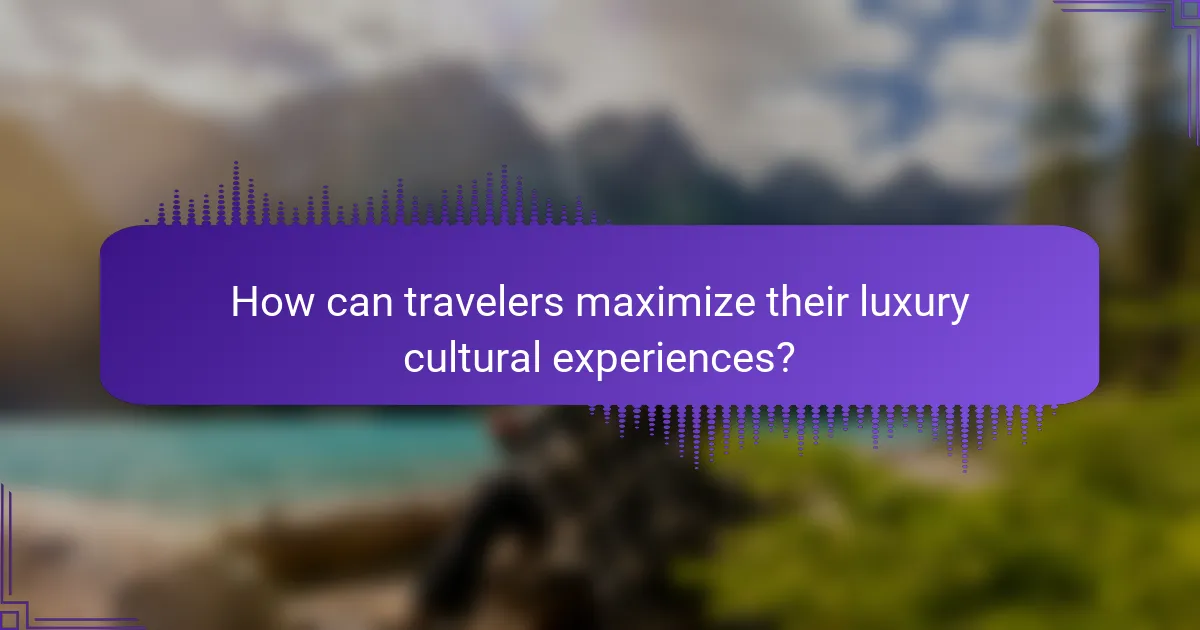
How can travelers maximize their luxury cultural experiences?
Travelers can maximize luxury cultural experiences by engaging deeply with local traditions and immersive activities. Prioritize personalized tours that offer unique insights into the culture. Seek experiences like private art viewings or culinary classes with renowned chefs. Establish connections with local artisans to understand their crafts. Choose accommodations that reflect local heritage, enhancing your overall experience.
What are the best practices for engaging with local cultures?
To engage effectively with local cultures, prioritize authenticity, respect, and openness. Immerse yourself in community traditions and seek genuine interactions with locals. Participate in cultural events, workshops, and culinary experiences to gain insights. Approach local customs with curiosity and a willingness to learn, fostering mutual respect. Building relationships can lead to unique and enriching experiences that deepen your understanding of the culture.
Which common mistakes should luxury travelers avoid?
Luxury travelers should avoid overscheduling, neglecting local customs, and focusing solely on high-end experiences. These mistakes can diminish the authenticity of cultural immersion.
Travelers should prioritize flexibility, allowing for spontaneous exploration of unique traditions. Engaging with locals provides insights that enrich the experience. Additionally, balancing luxury with authentic encounters enhances appreciation of the destination’s culture.
Lastly, overlooking lesser-known activities can lead to missed opportunities for genuine connection. Embracing both luxury and local experiences creates a more fulfilling journey.
How can travelers ensure a meaningful cultural exchange?
Travelers can ensure a meaningful cultural exchange by engaging with local communities and participating in authentic experiences. Prioritize interactions with locals through guided tours, workshops, or home stays. Seek out unique traditions and customs that reflect the area’s heritage. For instance, cooking classes can provide insights into local cuisine while fostering connections. Additionally, being open-minded and respectful enhances the exchange, allowing for deeper understanding and appreciation of different cultures.
